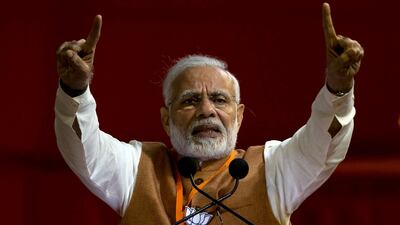Last week, seated beside the head of Niti Aayog, a government think tank established by Prime Minister Narendra Modi, India's chief statistician announced his institution would downgrade the growth figures of Mr Modi's predecessor.
Annual growth between 2005 and 2012 was not 7.75 per cent as had previously been estimated, but rather 6.82 per cent, said Pravin Srivastava. It puts growth under the previous government slightly below Mr Modi’s 7.35 per cent.
The opposition Congress party – in power during the period in question – reacted with fury, accusing Mr Modi and his contentious finance minister, Arun Jaitley, of “resorting to malicious and fraudulent jugglery of GDP figures to hide the enormous body blow caused by them to the Indian economy”.
The spectacle did not happen in isolation but follows a weeks-long public spat between Mr Modi’s government and India’s central bank, the Reserve Bank of India (RBI). And while the issue has an economic face, it is largely political. Up for re-election in May, and with his weighty economic promises, from jobs to housing, yet to emerge, Mr Modi is resorting to increasingly frenzied strategies to compensate.
Ever since his election in 2014, Mr Modi’s government has quietly pressed the RBI to do more to boost growth, raising fears for the bank’s independence. Faced with mounting criticism from more conservative elements within Mr Modi’s Bharatiya Janata Party (BJP), previous respected governor Raghyram Rajan decided suddenly to step down two years ago.
It was a worrying harbinger of what was to come. Because in recent months, with May’s elections fast approaching, the BJP government has launched an all-out attack on the RBI.
The spat culminated in a nine-hour meeting of the RBI's 18-member board in Mumbai last month. The string of policies they agreed led to a temporary detente with the government. But with lingering fears for its prized independence and persistent rumours that the bank's talented current governor Urjit Patel could resign, the crisis rumbles on.
There is precedent elsewhere for disagreement between bookish central bankers and politicians eager for positive headlines. Turkish President Recep Tayyip Erdogan’s relentless attacks on his country’s central bank left its independence in tatters, causing the lira to plummet earlier this year. And in the US, the Trump administration has pressed the Federal Reserve to lower interest rates to trigger growth.
But in India the attacks are more pernicious, not least because the RBI has no legal independence and because the bank has cultivated an impressive rate of growth in the world’s largest democracy for decades. Little good arises when governments involve themselves in the decisions of central banks. Ahead of elections where growth and development will be on the ballot, Mr Modi would do best to leave the RBI alone.
The truth is that after four years in office, Indians have been left disappointed by their prime minister – himself a former tea seller who rode to power on a wave of economic optimism. The Modi government promised 20 million jobs a year, but last year created just 1.43 million.
Petrol prices have hit historic highs under Mr Modi, despite low international oil prices, because of high excise taxes. And a series of financial scandals have sent shockwaves through not only India’s banking sector but also its towns and villages.
The so-called demonetisation in 2016 – where all 500 and 1,000 rupee banknotes were pulled from circulation to slash India's huge shadow economy – hit the poor extremely hard. And despite promises to double the revenues of farmers, suicide is at an all-time high among agricultural workers.
Scores of other assurances, from universal health coverage to housing for all, simply have not come about. And many of India’s poor and middle class voters have lost faith in Mr Modi’s government.
To be clear, Mr Modi and Mr Jaitley have presided over four years of decent growth, but with an estimated 12 million young Indians entering the job market annually, employing them requires annual growth of more than 10 per cent, according to the departed governor, Mr Rajan.
Time will tell whether massaging the figures can sway voters living with their own realities on the ground. (When the chief statistician announced the growth revisions last week, the BJP’s army of Twitter acolytes were quick to share the news.) But in sucking independent economic institutions into a political firestorm, Mr Modi has shown his vulnerability.
And his attempts to lock in support ahead of next year's polls have not been confined to economics. There are also concerns about the BJP's use of Hindu nationalism as a vote winner among an electorate where other faiths, comprising just a fifth of the population, lack representation. In March, India drew headlines when it emerged a committee of scholars had been formed in 2016 to prove that Hindus are descended from India's first inhabitants.
So the BJP were left stunned in November 2017, when the party suffered a disappointing blow in the Gujarat state elections, winning fewer than 100 of 182 seats and even losing Mr Modi’s hometown by a wide margin. The prime minister was Gujarat’s chief minister from 2001 to 2014 and considered it a key bastion of support.
With less than six months to go until India’s election, the political landscape could get yet more heated. Mr Modi could sweep to victory again ahead of the beleaguered opposition Congress party. But should he do so, history could judge a leader who secured a second term by stoking religious tensions and cooking the books.

